Are you considering studying in Canada and planning to work here after completing your program? If so, there are some important factors you need to know to ensure you choose the right school. In this guide, I’ll explain how to identify schools to avoid and every single details in terms of searching for the right universities or right colleges in Canada that offer postgraduate work permit eligible programs for international students.
In Canada, one of the crucial aspects you should know as an international student is the Designated Learning Institutions (DLI) list. I’ll guide you on how to check if a university or college is on the DLI list and whether they offer postgraduate work permit eligible programs. If you’re interested in pursuing your education and career in Canada, this information will be of great value to you, keep on reading!
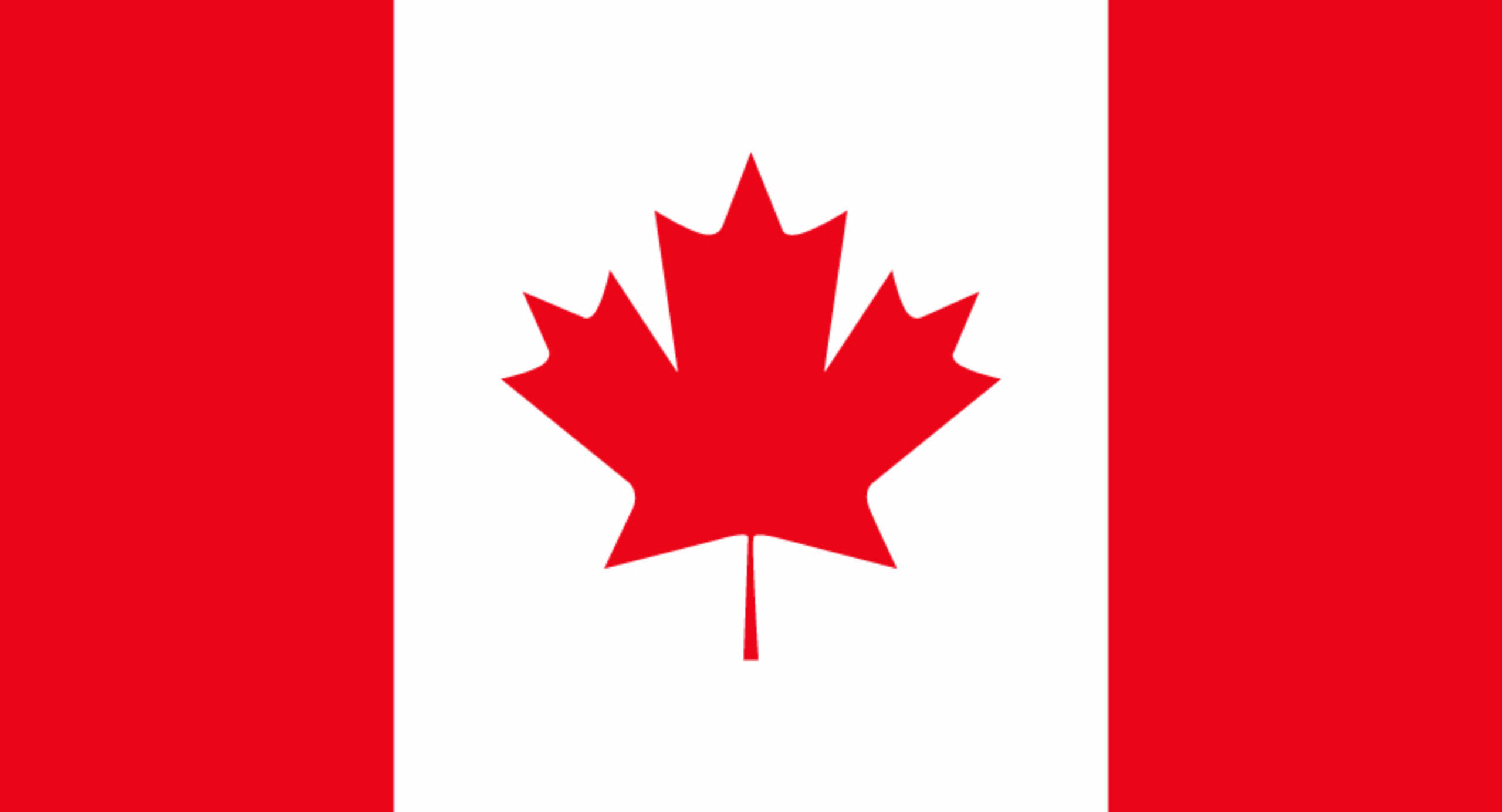
What is DLI
DLI means designated learning institutions and their institutions are approved by the government either provincial or territorial government to host international students. If you want to obtain a postgraduate work permit after completing your studies, attending a DLI is a must.
However, not all DLIs make you eligible for a postgraduate work permit. Some schools may lose their DLI status, making their students ineligible for work permits. To avoid such situations, it’s crucial to research your chosen institution thoroughly.
What is Post-Graduation Work Permit (PGWP)
The Post-Graduation Work Permit (PGWP) is a document that allows international students who have graduated from a participating Canadian post-secondary institution to work in Canada for a specific duration. The PGWP is designed to provide eligible graduates with valuable Canadian work experience, which may help them qualify for permanent residence in Canada through various immigration pathways.
To be eligible for a Post-Graduation Work Permit, you typically need to meet the following criteria:
- Study Program Eligibility: You must have completed a full-time program of study at a participating post-secondary institution in Canada. The program must be at least eight months in duration and lead to a degree, diploma, or certificate.
- Graduation Confirmation: You must have received written confirmation from the educational institution indicating that you have met the requirements for completing your program of study.
- Valid Study Permit: You must have held a valid study permit during your time as a student in Canada.
- Application Timing: You need to apply for the PGWP within a specific time frame. Generally, you have up to 180 days (about six months) from the date of your graduation to apply for the PGWP.
The duration of the PGWP is usually based on the length of your study program. For instance, if you completed a program of two years or more, you might be eligible for a PGWP valid for up to three years. However, if your program was shorter, the validity of the PGWP would be shorter as well.
It’s essential to check the Immigration, Refugees and Citizenship Canada (IRCC) website for the most up-to-date information on eligibility criteria and application procedures, as immigration policies can change over time.
To qualify for a postgraduate work permit, you are required to enroll in a post-secondary institution. This includes universities, colleges, vocational schools, and CEGEP if you’re in Quebec. Please note that primary and secondary schools are not eligible for this permit, because a school offers postgraduate work permit programs doesn’t mean that every program in that school will make you eligible to get your work permit after you’re done schooling.
When applying for a study permit, you must obtain an acceptance letter from a school listed on the DLI list. This step ensures a smooth visa application process and study permit approval. Just in case your visa might have been rejected before, this might be a reason. Before you apply to any university or any college, make sure they are under the DLI list so that you don’t have any issues when you apply for your visa and your study permits.
Canada is home to numerous post-secondary institutions, making it impractical to list them all individually. For instance, Ontario, one of Canada’s 11 provinces, boasts an impressive count of 505 secondary institutions. With such a vast number, it’s not feasible to mention each one here.
However, on this website, we will guide international students on how to identify the right universities and colleges in Canada. We’ll provide detailed explanations to help you discern which schools to avoid and navigate the process of selecting the perfect educational fit for your journey in Canada.
To check if a university or college is on the DLI list and offers postgraduate work permit programs, you can use the Canadian government’s official website study link. The website provides a search option where you can explore DLIs by province or territory. This way, you can streamline your options and find suitable schools for your desired field of study.

When you click on the Canadian government’s official website study link, you’ll be directed to a page where you can access valuable information. Here, you’ll find the designated learning institution list and details about postgraduate work permits.
If you’re considering studying in Canada and want to check if your desired school is on the DLI list and offers postgraduate work permits, this is the section you need. Simply scroll down to find the option to view the list by province or territory. The search box makes it incredibly easy for students, especially if you’re uncertain where to start or haven’t selected a school yet.
Step 1: Make your selection
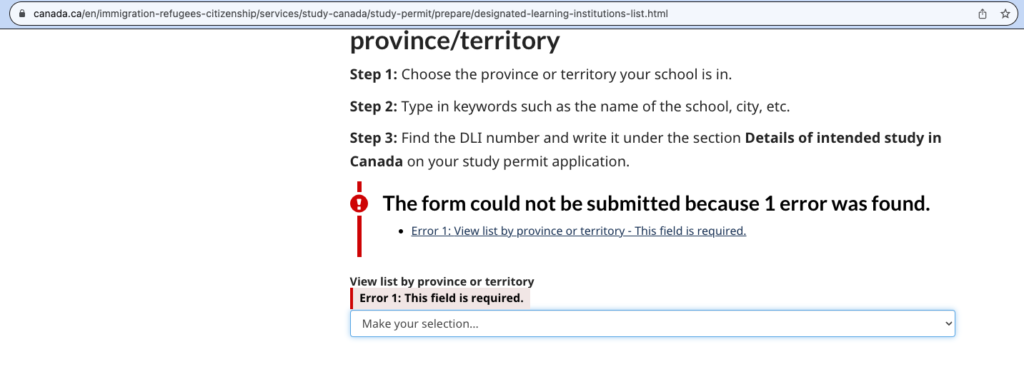
Step 2: Choose a province/territory
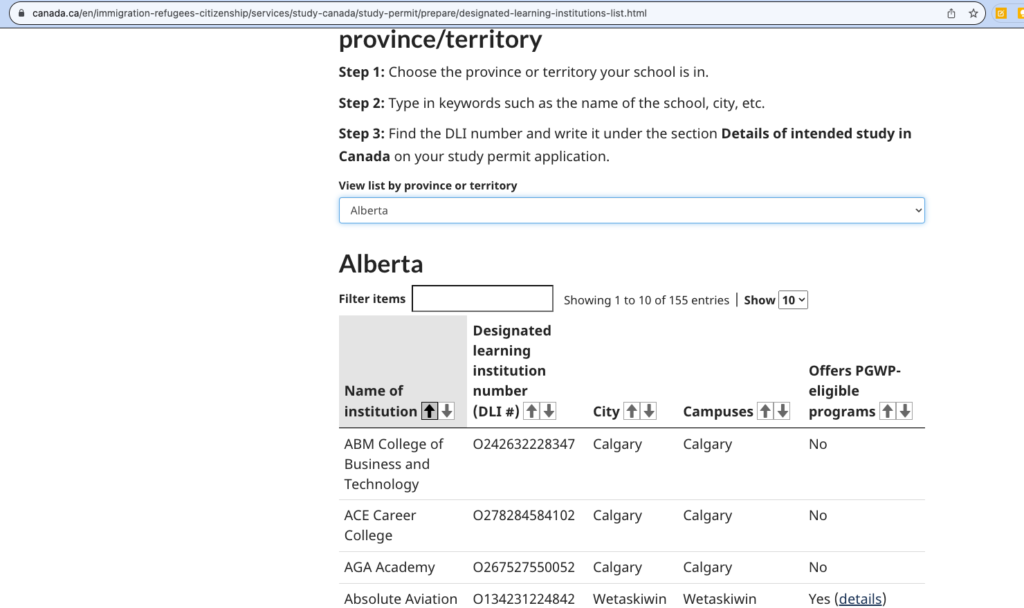
Step 3a: You have the option to search by applying a filter, simply type in the name of the university you prefer. (“Yes” indicates that they offer Post-Graduation Work Permit (PGWP), whereas “No” indicates that they do not provide PGWP.)
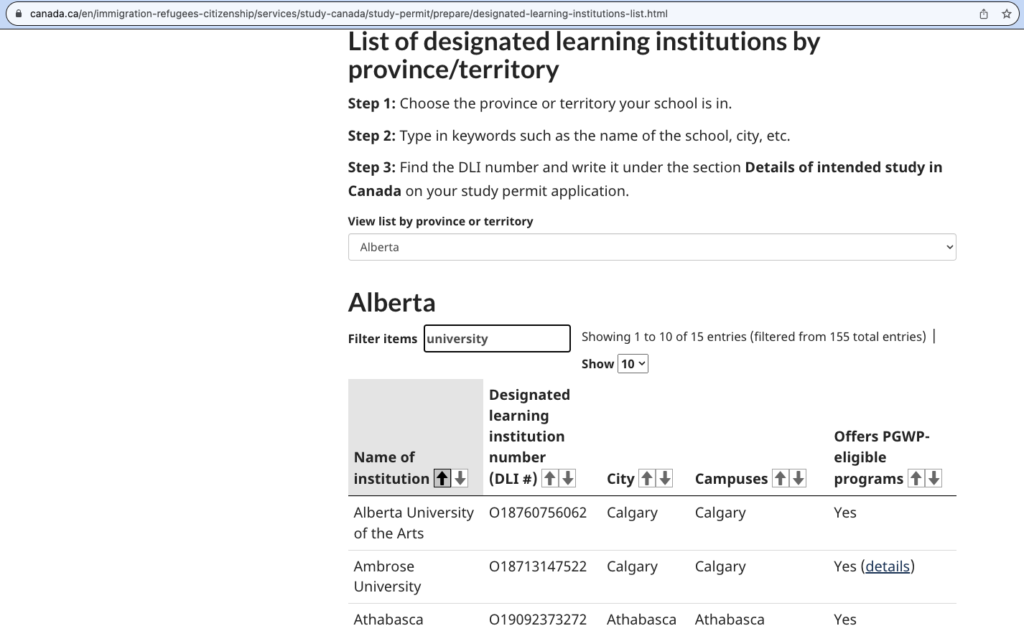
Step 3b: You have the option to search by applying a filter, simply type in the name of the college you prefer.
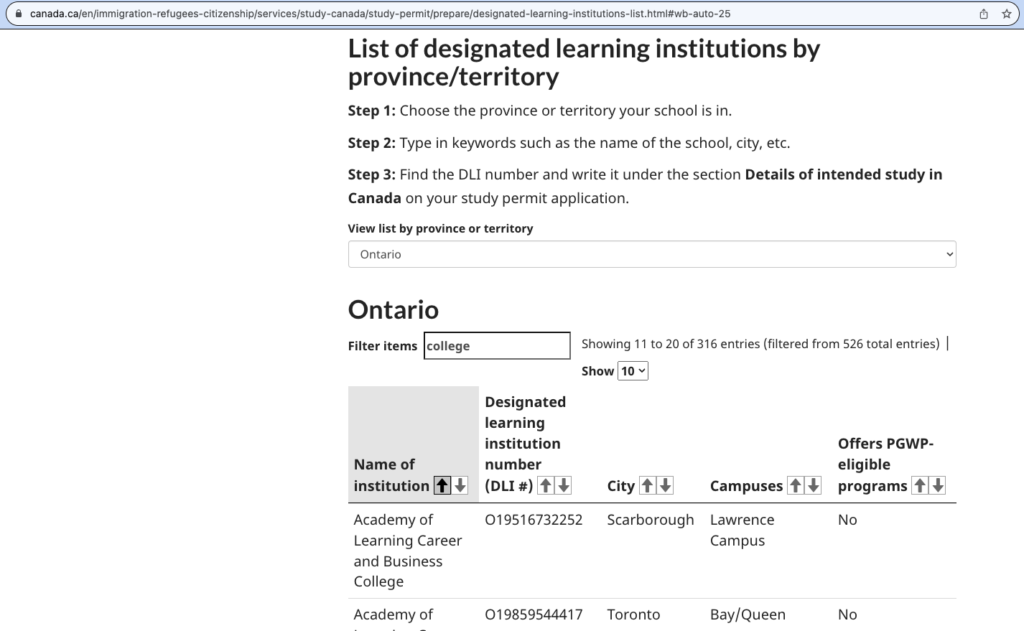
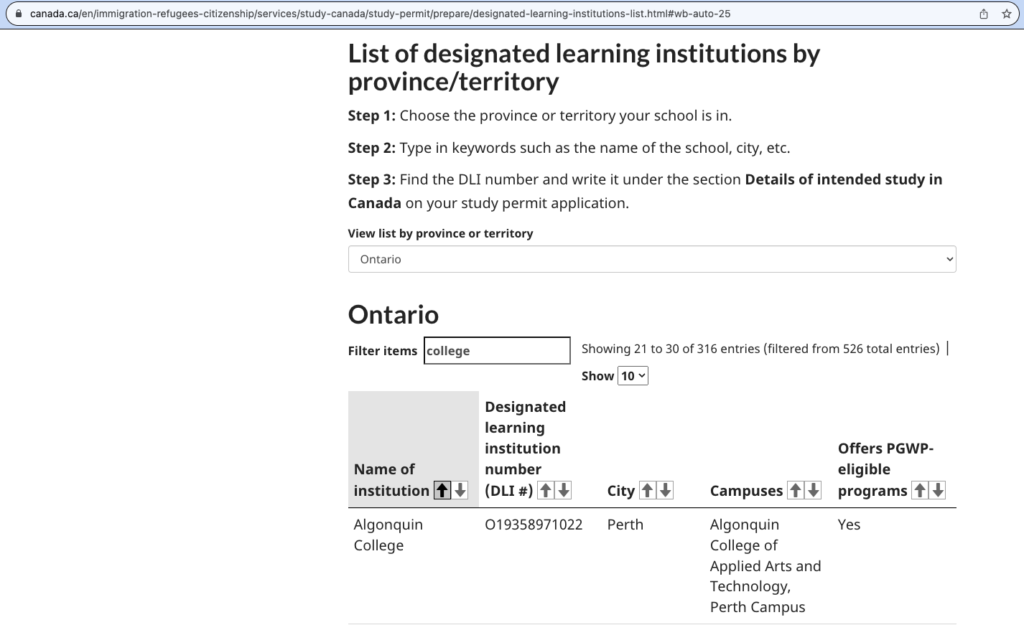
By using this feature, you can streamline your options and make the process of choosing a school in Canada much smoother. Instead of searching through numerous colleges, you can quickly identify the provinces with the properties you desire and click on them to explore further.
Although a school may offer postgraduate work permit programs, it’s essential to note that not all programs within the school automatically make you eligible for a work permit upon completion of your studies. Let me illustrate this point using the example of Adler Graduate Professional School in Toronto. While they do provide postgraduate welcoming programs, eligibility for a postgraduate work permit is specific to certain degrees. To find out if you qualify for a work permit, click on the program details, where you’ll discover that you are eligible only if you successfully complete one of the specified degrees and meet all other postgraduate welcoming criteria. Ambrose University can also be included in the same approach.
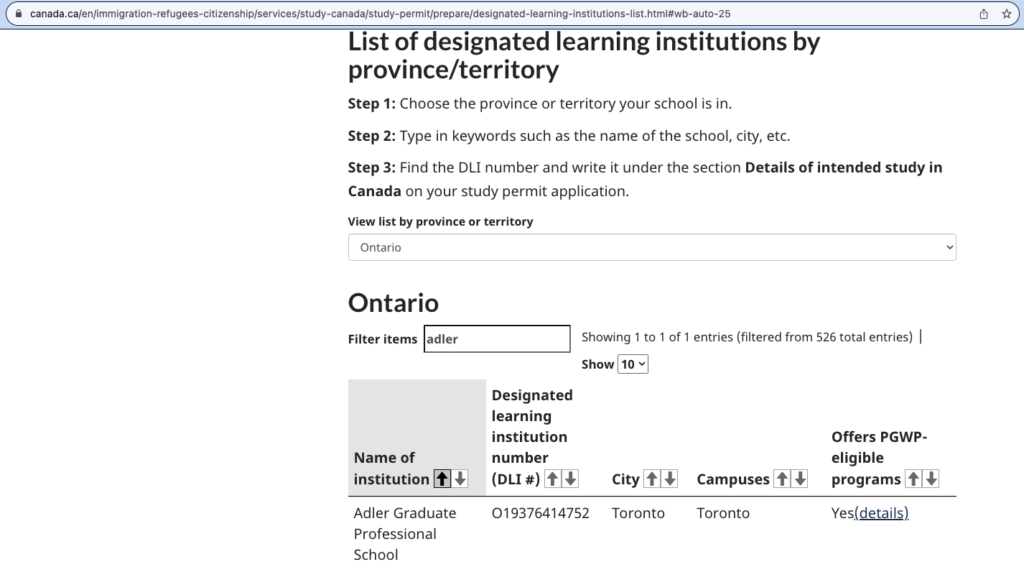
Unfortunately, a school can lose its Designated Learning Institution (DLI) status. When browsing through the CIC website, you may come across information stating that if the school you are currently studying at loses its DLI status after you have obtained your study permit, you are allowed to continue your studies until your current permit expires. However, it’s crucial to take prompt action and extend your study permit, but only by enrolling in an institution that remains on the DLI list.
Here’s the catch: If the school you apply to during your educational journey loses its DLI status by the time you complete your program there, you will face limitations when renewing your study permit. The only way to extend or renew your study permits in Canada is by enrolling in another DLI-certified institution.
I trust your study journey in Canada has been made hassle-free and delightful! Don’t hesitate to share this valuable information with your loved ones.

Share this content: